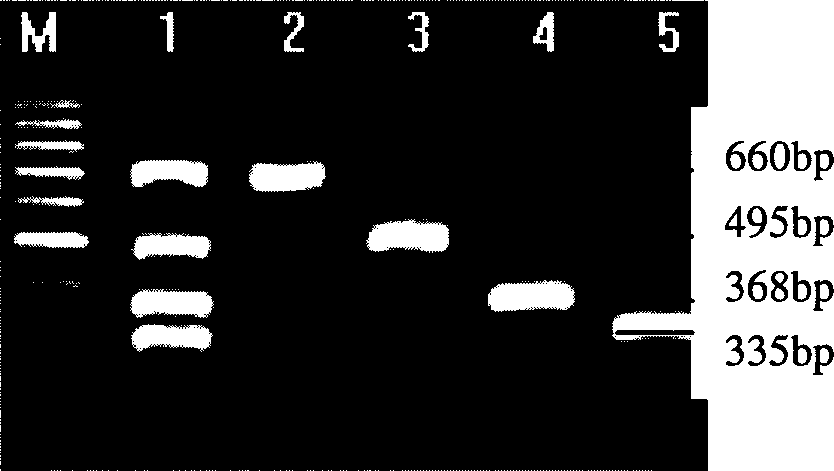Frequent pathogenic bacteria multiple PCR rapid detecting kit for domestic animal meat and aquatic product and its detecting method
A technology for detection kits and aquatic products, which is applied in biochemical equipment and methods, and the determination/inspection of microorganisms, which can solve the problems of large sample size and urgent time, and achieve good specificity
- Summary
- Abstract
- Description
- Claims
- Application Information
AI Technical Summary
Problems solved by technology
Method used
Image
Examples
Embodiment 1
[0042] Embodiment one: the PCR detection of Salmonella
[0043] 1. Sample DNA was extracted by CTAB method. Take 2 g of the sample and place it in a sterilized Erlenmeyer flask filled with 10 mL of CTAB lysis buffer, and incubate with shaking at 65°C for 1 h. Add 10 μL of 20 mg / mL proteinase K and incubate at 65°C for 2 h with shaking, transfer 1 mL of the culture solution to a 1.5 mL Eppendorf tube, and centrifuge at 13,000 g for 10 min. Transfer 800 μl of supernatant to a new Eppendorf tube, then add 600 μL of chloroform, vortex the sample, and centrifuge at 13,000 g for 10 min. Aspirate 600 μL of the aqueous layer and transfer it to a new Eppendorf tube, then add 500 μL of isopropanol, let it stand at room temperature for 30 min, recover the DNA precipitate, and dissolve it in 50 μL of sterilized double-distilled water. The composition of CTAB lysis buffer: 2% CTAB, 1.4mol / L Nacl, 0.1mol / L Tris-Hcl, 20mmol / L EDTA, pH8.0.
[0044] 2. Primers:
[0045] Upstream: 5’-ATC GG...
Embodiment 2
[0050] Example 2: PCR detection of enterohaemorrhagic Escherichia coli
[0051] 1. The sample DNA was extracted using the CTAB method described in Example (1).
[0052] 2. Primers:
[0053] Upstream: 5’-CAC ACG GAG CTT ATA ATA TTC TGT -3’
[0054] Downstream: 5'-GAC ATC ATT TGA CTC ATT AAA -3'
[0055] 3. Amplification reaction system: 10×PCR buffer 2.5μL, 2mmol / LMgCl 2 , 200μmol / LdNTP, 100μmol / L primer, 2.5uTaq enzyme, 2μL sample DNA, 25μL reaction system.
[0056] 4. Amplification reaction conditions: pre-denaturation at 94°C for 5 minutes; 30 cycles of denaturation at 94°C for 1 minute, annealing at 58°C for 1 minute, and extension at 70°C for 1 minute; extension at 72°C for 10 minutes; and storage at 4°C.
[0057] 5. Amplification reaction results: The amplified product was detected by 12g / L agarose gel electrophoresis and analyzed by UV I gel imaging system, and there was a band at 335bp.
Embodiment 3
[0058] Example 3: Simultaneous detection of Salmonella and enterohaemorrhagic Escherichia coli by double PCR
[0059] 1. Sample DNA was extracted using the CTAB method described in Example (1).
[0060] 2. Salmonella Primer: Upstream: 5'-ATC GGC GTT ATC CCT TTC TCT GGT G -3' Downstream: 5'-ATG TTG TCC TGC CCC TGG TAA GAG A -3'; Enterohemorrhagic Escherichia coli Primer: Upstream: 5 '-CAC ACG GAG CTT ATA ATA TTC TGT -3'
[0061] Downstream: 5'-GAC ATC ATT TGA CTC ATT AAA -3', add the above two pairs of primers to the same PCR tube at the same time.
[0062] 3. Amplification reaction system: 10×PCR buffer 2.5μL, 3.0mmol / L MgCl 2 , 250 μmol / L dNTPeach, primer concentrations were: Salmonella 40nmol / L, EHEC 80nmol / L, 1.3U Taq enzyme, sample DNA 2μL, reaction system 25μL.
[0063] 4. Amplification reaction conditions: use touchdown PCR method. ① Pre-denaturation at 94°C for 5 minutes; ② Denaturation at 94°C for 1 minute; ③ Annealing for 2 minutes, from 63°C to 55°C, 2 cycles for...
PUM
 Login to View More
Login to View More Abstract
Description
Claims
Application Information
 Login to View More
Login to View More - R&D
- Intellectual Property
- Life Sciences
- Materials
- Tech Scout
- Unparalleled Data Quality
- Higher Quality Content
- 60% Fewer Hallucinations
Browse by: Latest US Patents, China's latest patents, Technical Efficacy Thesaurus, Application Domain, Technology Topic, Popular Technical Reports.
© 2025 PatSnap. All rights reserved.Legal|Privacy policy|Modern Slavery Act Transparency Statement|Sitemap|About US| Contact US: help@patsnap.com

